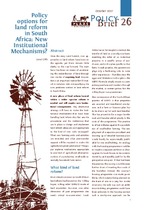Policy options for land reform in South Africa: New institutional mechanisms?
Abstract
Since the 2005 Land Summit, new approaches
to land reform have been on the agenda, yet there remains little clarity on the way forward. The main focus has been on means of accelerating
the redistribution of land through new modes of acquiring land. Acquisition
is an important matter but if treated
in isolation risks mis-specifying the core problems evident in land reform in South Africa.
A new phase of land reform located within a wider agrarian reform is needed and will require new institutional
arrangements. Any alternative strategy will have to revise the institutional
mechanisms that have been handling land reform thus far. Are the procedures and the institutions that are in place to design and implement land reform adequate and appropriate to the kind of new tasks envisaged? What new farming units and activities are intended, and what post-transfer support will be required to make this agricultural system productive? This paper
explores mechanisms appropriate to one kind of agricultural alternative: a vision of a productive, small-scale essentially
household farm sector.

